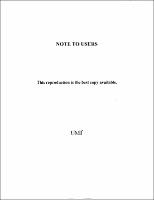Please use this identifier to cite or link to this item:
https://hdl.handle.net/20.500.12202/1141| Title: | The influence of formative pre-service experiences on the teacher self-efficacy of Jewish day school teachers |
| Authors: | Tuchman, Stuart Elie |
| Keywords: | Educational psychology. Teacher education. Elementary education. Judaic studies. |
| Issue Date: | 2010 |
| Publisher: | ProQuest Dissertations & Theses |
| Citation: | Source: Dissertation Abstracts International, Volume: 71-05, Section: A, page: 1537.;Advisors: Chaim Feuerman. |
| Abstract: | Formal pre-service training has been shown to be effective in building teacher self efficacy beliefs (see, for example, Woolfolk Hoy & Burke Spero, 2005). However, the impact of other, less formal, "teacher-like" pre-service experiences on the formation of efficacy beliefs has not previously been investigated. This study examined the associations between both formal and informal formative pre-service experiences and teacher self-efficacy. In addition, the effect of years of teaching experience on these associations was investigated. Three hundred fifteen teachers of general and Judaic studies in Jewish day schools in the United States responded to a survey about their pre-service experiences as youth advisors, camp counselors, and childcare supervisors. The survey also included two measures of teacher self-efficacy, the Teacher Sense of Efficacy Scale (TSES) and the Personal Teacher Efficacy (PTE) subscale of the Teacher Efficacy Scale (TES). Hierarchical multiple regressions were performed in order to remove potentially confounding variables from the equation Consistent with previous research, formal pre-service training and positive student teaching experiences were found to be associated with positive teacher self-efficacy. In addition, each of the three informal, formative experiences investigated in this study was found to have a positive association with teacher self-efficacy. Interestingly, formal and informal pre-service experiences appear to be associated with different aspects of teacher self-efficacy. Formal teacher training was most strongly associated with efficacy for instructional practices, while the informal experiences were most strongly associated with efficacy for student engagement. The impact of both formal and informal experiences was found to be persistent, and did not appear to fade over time. On the contrary, for those variables where an interaction with years of teaching was detected, the direction of the interaction indicated that the efficacy beliefs of the most senior teachers were most related to their pre-service experiences. These findings have important implications for future research and for the practice of both teacher trainers and those charged with recruiting and supporting teachers. |
| URI: | https://ezproxy.yu.edu/login?url=http://gateway.proquest.com/openurl?url_ver=Z39.88-2004&rft_val_fmt=info:ofi/fmt:kev:mtx:dissertation&res_dat=xri:pqm&rft_dat=xri:pqdiss:3407243 https://hdl.handle.net/20.500.12202/1141 |
| Appears in Collections: | Ferkauf Graduate School of Psychology: Doctoral Dissertations |
Files in This Item:
| File | Description | Size | Format | |
|---|---|---|---|---|
| Tuchman OA Azrieli PQDT The_influence_of_formative_pre.pdf | 5.42 MB | Adobe PDF |  View/Open |
Items in DSpace are protected by copyright, with all rights reserved, unless otherwise indicated.
